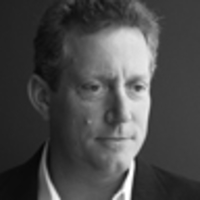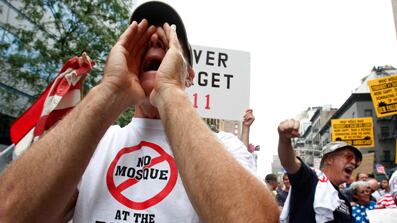It's not surprising that nine years after the 9/11 attacks, there’s a surge of anti-Muslim sentiment. What's strange is that it took so long to come to a head. Plus, our complete coverage of the anniversary.
One important question that is rarely asked about the ground zero controversies—or about the surge in anti-Muslim feeling among Americans, which a Washington Post poll on Wednesday put at its highest since 9/11—is simply: What took so long? Nine years ago, the United States was attacked by Muslims in the name of Islam, leaving many dead. It wasn’t the first time, but it was by far the worst. We have been in some sort of war ever since, and the enemies always seem to be Muslims, with religion as their declared chief motivator. Why did it take nine long years for Islamophobia to get up a head of steam?

It isn’t as though people didn’t try. There have been occasional Islamophobic moments ever since that morning. Italian Prime Minister Silvio Berlusconi (in September 2001) claimed Western civilization was superior to Islam, drawing catcalls throughout Europe. Lt. General William Boykin spoke of the Iraq War as a “crusade." There were even some attacks on Muslims. And yet the “anti-Muslim” incidents that struck me most at the time—they were the deadliest—were perpetrated against Sikhs. Sikhs are, of course not Muslim. (Arguably, their religious culture developed in competition with Islam.) The 9/11 backlash, in short, was not, under the circumstances, very religion-specific. It reminded me more of the generalized anti-Middle Easterner feelings familiar from the 1970s oil shocks or the Gulf War, when you could buy Iraqnophobia T-shirts for a laugh.
We actually aren’t sure anymore that we will eventually win.
For a long time after 9/11, serious anti-Muslim feelings could not get much social traction. Why? One factor was the sturdy leadership of George W. Bush, who was something of a super-Christian in his private life (so we were told) but immediately and consistently drew a line against any Islamization, or sacralization, of the conflict we were in. Doing this, he embodied one of the oldest and best American traditions (or paradoxes): the marriage of a religiously saturated and fervent society with secularist principles.
• Full coverage of the 9/11 anniversaryAlso, there was something inherently ridiculous about al Qaeda, the 9/11 attacks, jihadism, all of it. One has trouble acknowledging this, because the results have been so horrible—and yes, I’ve lost people to al Qaeda, and I was there that morning nine years ago, covered in the dust of the towers, having watched the second one fall in front of me. Nonetheless, the ridiculousness has to be acknowledged: Having religious lunatics declare holy war on us never made the slightest sense, except to them. The only solid justification for their actions could only be made in their terms, which was about the last thing we were inclined to do. They were outside of our story and still are.
For al Qaeda, it was about religion, but for us it couldn’t be. That was their version, not ours. This would, in my view, be something for Americans to feel proud about, except that it wasn’t really that hard to do. Of course we didn’t think al Qaeda represented Islam. And our responses to the attacks had many motivations, but they were never motivated by religion or even anti-religion—or by anti-Muslim feeling.
What has changed in nine years? First of all, jihadi terrorism has not gone away, despite nine years of sustained American efforts: invasions, assassinations, speeches, regime changes, interfaith dialogues, sanctions, food aid, military aid, schools and roads and hospitals. Meanwhile our pre-9/11 stories—about globalization, the advance of human rights, the renewal of multilateralism, the spread of democracy and free markets, and the guarantee of peace derived from overwhelming military power—have not prevailed as they were expected to. The premise that we would swiftly demonstrate the practical and moral superiority of American-led liberal modernism, and Islamism would whither, has proved wrong. We actually aren’t sure anymore that we will eventually win. We are becoming, in a sense, less interested in what our enemies might be thinking—less interested in freeing their inner secularists, or finding common ground—and we consider abandoning engagement for withdrawal. The U.S. never wanted Afghanistan or Iraq anyway, or Somalia, or any number of other places. If American victories there are somehow made impossible by Islam, then perhaps these places should be left to Islam.
An important part of this urge to withdrawal is the uncomfortable fact that America’s Muslim allies are often just slightly less contemptuous of American efforts than America’s Muslim enemies are. Jihadism is not, and I imagine never will be, a generally held view among Muslims. But anti-Americanism could well be and possibly is. There are many reasons for this. But one result of it, today—in dramatic contrast to the period before and just after 9/11—is that many Americans have come to perceive Muslims, a vast and heterogeneous, religiously defined group, as, to some degree, the enemy.
It took nine years even to approach this point; that is how much it goes against the grain.
Is America becoming, then, Islamophobic? I don’t think so. Hatred for a religion is not something you acquire quickly, not even over nine years. Americans do seem to be in a state of high ideological nervousness. American political reactions to 9/11 have taken us pretty much from one disaster to another, and now the process is coming back to where it started. We’ve been abroad in Muslim lands for nine years, attempting to heal the wound and make things right, and now we’re back at the wound itself, unhealed.
The healing has been made more difficult by those nine years of disappointment, failure and confusion. The anxieties about the Park51 mosque—political opportunism to one side—are, I think, rooted in a fear that 9/11 will gradually become “about religion.” When this all began nine years ago, the only people who believed this lunacy was about religion were the people carrying it out. But since then the tug of events has pulled that day toward the sacred sphere, in the worst way. We as a people have to resist that tug. There is no wisdom in that direction, and no healing, either.
Scott L. Malcomson is the author of Generation's End: A Personal Memoir of American Power After 9/11, in stores this week. He previously worked as senior adviser to the late Sergio Vieira de Mello, formerly UN High Commissioner for Human Rights.





